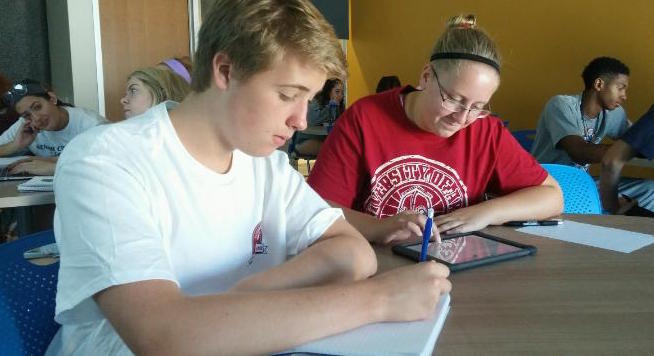Students of the University of Arkansas Class of 2019 are the first to sit at the round tables in 413 Champions Hall for Composition I, a core class that depends on interaction and peer review to develop writing skills. Until now, Composition I has not been taught in classrooms designed for this approach to teaching.
"Classrooms with round tables have demonstrated effects on the success of women and minorities in much larger STEM courses. They have proven to be a learning technology in their own right," said Michelle Gibeault, English and communication librarian. Gibeault has published on teaching research instruction sessions in the SCALE-UP spaces developed through the physics program at North Carolina State University (a classroom environment that has been adopted by over 200 colleges and universities).
"The teaching modes these spaces are designed to reinforce, collaborative learning segments interspersed with lecture components, fosters student engagement in library instruction sessions, which are basically guest activities and discussions led by me," Gibeault said. "I can easily see how the interactive opportunities and small-group cohesion that these round tables make possible would reinforce the ideals of our composition curriculum."
Composition instructor Julia Paganelli taught in a much different classroom in Old Main last semester:
"When I first saw my classroom, I was worried that the round tables would prevent students from writing well, because often students are terrified of letting others see their writing. I was also concerned that the students would spend more time talking to one another than working.
"After conducting a few classes, I realized what an asset the tables are to my students' learning. My students are able to conduct small discussions and then bring their thoughts, as a team, to the rest of the class. It allows all my students to be heard instead of a select few."
The growth of online education has already started to put the value and benefits of interpersonal interaction in learning into sharp relief—but to take full advantage of some of the benefits of face-to-face instruction, the spaces, pedagogies, and technologies need to be thoughtfully considered.
"Last year, the University Libraries, purchased a mobile instruction unit with 12 iPads which we call Project Ferrari," said Gibeault. "Librarians are always eager to teach research instruction, but I am particularly delighted to teach sessions in Champions Hall. These are dream classrooms for my teaching strategies," said Gibeault. With Project Ferrari, library instruction doesn't have to be done in a computer lab and we can meet the students where they are."
A chapter on Project Ferrari will be featured in the Library Assessment Cookbook, an anthology from the Association of College & Research Libraries to be published in 2016.
Contacts
Michelle Gibeault, English and communication librarian
MULN
479-575-3362, gibeault@uark.edu
